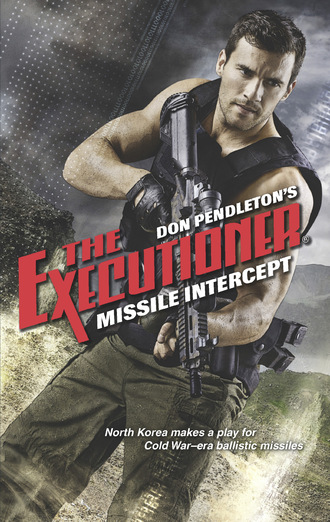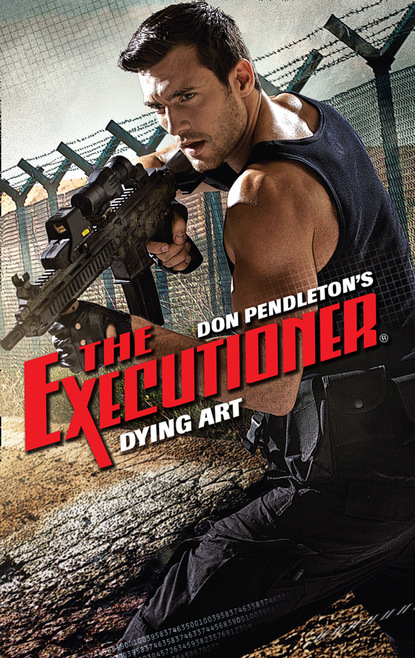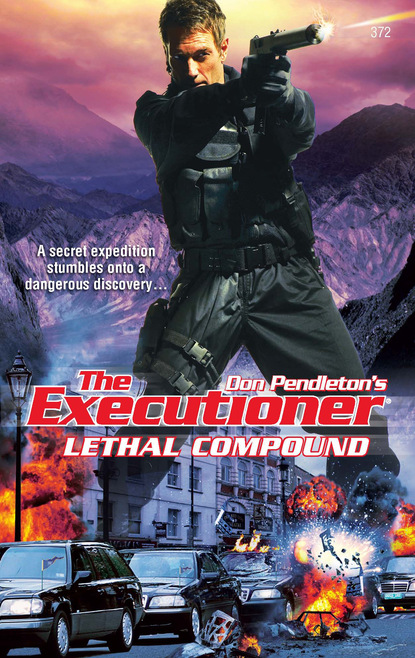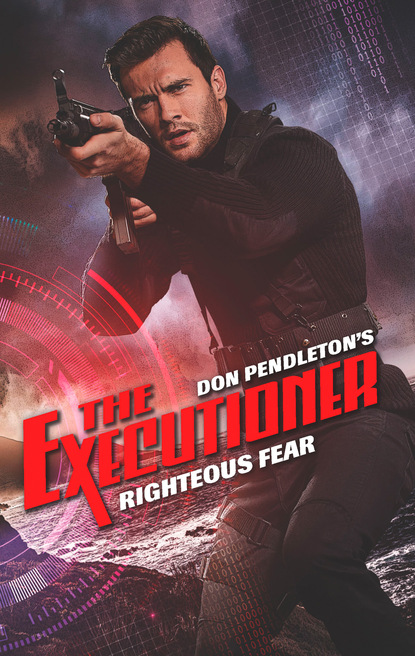
Полная версия
Missile Intercept

WITHIN STRIKING DISTANCE
It’s no coincidence that Cuban missiles disappear at the same time two scientists are kidnapped from a conference in Mexico. And all the clues lead to North Korea. The country already has atomic bombs, and now they’ve got everything they need to perfect long-range missile technology. Unless Mack Bolan can stop them.
Determined to save the scientists and prevent a world war, Bolan learns he’s not the only one with his sights set on retrieving the missiles. The Iranians are also after the technology, along with a North Korean army colonel and his ruthless assistant. With a killer on his tail, the Executioner has to eliminate the international threat...or die trying.
Grimaldi buzzed the airstrip, diving at the accelerating plane.
The aircraft jerked to the left, slowing. The side door flew open and a figure jumped to the ground. Thin streams of red tracer rounds zoomed upward.
“Whoever the hell that guy is,” Grimaldi said over the radio, “I’m taking fire, and it’s coming close!”
Bolan paused, sighted the hostile gunner and squeezed off a quick burst. The man twisted in Bolan’s direction, and the Executioner fired again. His target jerked slightly. He was hit—but how badly?
Seconds later he had his answer as the red tracer rounds began zipping past him. He ducked, rolled to the left and came up on one knee just as the firing stopped. He saw the hostile leaning back, his right arm extended behind him.
Bolan fired another burst, and seconds later the flash and concussion of an explosion washed over him, accompanied by a second, larger conflagration as the plane went up in a gigantic fireball.
Missile Intercept
Don Pendletons

It is only those who have neither fired a shot nor heard the shrieks and groans of the wounded who cry aloud for blood, more vengeance, more desolation.
—William Tecumseh Sherman
There is nothing pretty about a nuclear conflagration. Yet the insanity continues. Images of Hiroshima and Nagasaki should serve to stay the hand of all leaders. But they don’t. We must stand strong and protect the innocents.
—Mack Bolan

Nothing less than a war could have fashioned the destiny of the man called Mack Bolan. Bolan earned the Executioner title in the jungle hell of Vietnam.
But this soldier also wore another name—Sergeant Mercy. He was so tagged because of the compassion he showed to wounded comrades-in-arms and Vietnamese civilians.
Mack Bolan’s second tour of duty ended prematurely when he was given emergency leave to return home and bury his family, victims of the Mob. Then he declared a one-man war against the Mafia.
He confronted the Families head-on from coast to coast, and soon a hope of victory began to appear. But Bolan had broken society’s every rule. That same society started gunning for this elusive warrior—to no avail.
So Bolan was offered amnesty to work within the system against terrorism. This time, as an employee of Uncle Sam, Bolan became Colonel John Phoenix. With a command center at Stony Man Farm in Virginia, he and his new allies—Able Team and Phoenix Force—waged relentless war on a new adversary: the KGB.
But when his one true love, April Rose, died at the hands of the Soviet terror machine, Bolan severed all ties with Establishment authority.
Now, after a lengthy lone-wolf struggle and much soul-searching, the Executioner has agreed to enter an “arm’s-length” alliance with his government once more, reserving the right to pursue personal missions in his Everlasting War.
Contents
Cover
Back Cover Text
Introduction
Title Page
Quote
Legend
Prologue
Chapter 1
Chapter 2
Chapter 3
Chapter 4
Chapter 5
Chapter 6
Chapter 7
Chapter 8
Chapter 9
Chapter 10
Chapter 11
Chapter 12
Epilogue
Copyright

Prologue
Palatial Garden near Kim Il Sung Square
Pyongyang, North Korea
Colonel Yi Sun-Shin of the Korean People’s Army of the Democratic People’s Republic of Korea watched as Gumon Yoong, the Black Dragon, stalked his last two opponents. Ten bodies littered the ground between them. The Dragon, clad in his dark special forces military fatigues, had dispatched the others with a series of deft blows, punches, whirling kicks and chopping strikes with the edge of his hand.
At least these executions were more entertaining than the last batch, Yi thought. Those had been carried out with an antiaircraft gun, leaving the hapless general and his assistant little more than misshapen piles of bones and flesh on the firing range. It was like using a sledgehammer to smash a mouse.
One of the Dragon’s remaining opponents assumed a fighting stance, his fists outstretched.
The Dragon smirked, continuing his steady advance.
His opponent lurched forward and threw a high roundhouse kick, which the Dragon brushed away with a casual flick of his hand.
The man twisted, executing a spinning back kick.
Instead of blocking the blow, the Dragon stepped inside the arc of the kick, letting his opponent’s leg curl around him. The Dragon’s hands were a blur as they struck the man’s exposed neck, the tandem blows leaving his head flopping like a broken doll’s. He slipped to the ground, a trail of blood leaking from a corner of his mouth, his eyes open and sightless.
The Dragon’s last opponent glanced around nervously, but the stone walls of the garden were high. There was no place to flee, yet he tried, turning and running away at full speed. The Dragon pursued him, closing the gap easily and then leaping into the air, his left leg tucked, the right cocked and ready. The Dragon’s right foot shot out, clipping the back of the running man’s neck. He fell face-first onto the hard ground as the Dragon landed lightly on his feet.
After grunts of approval, the country’s leader and his entourage stood and filed out of the garden without so much as a word, heading to the front of the building for the commencement of the Victory Day parade.
Yi surveyed the carnage. The last remaining members of the freighter that had been seized in the Panama Canal now lay dead. Such was the price of failure in the march toward victory. Yi glanced at his watch. It had taken the Dragon just over three minutes to dispatch them all.
The colonel knew his fate would be similar if he failed in his mission. It had been a warning as well as an example. “The bungling incompetents have disgraced us with their failure,” his immediate supervisor, General Song Hai-Son, had said. “They will be dealt with immediately prior to the parade, and then our supreme commander will be informed of your coming mission.”
The juxtaposition of the two events was not lost on Yi. Mission failure was not an option. Any outcome except total and complete success would be considered an affront to their leader’s authority, and whether the transgression was real or imagined did not matter. To fail was a death sentence.
“Colonel Yi,” a voice called from the arched doorway.
He turned and saw General Song standing by the ornately fashioned arch. Yi approached him, stopped, came to attention and saluted.
“Yes, General.”
Song snapped his fingers at the soldier standing beside him. The man remained at attention, motionless.
“Go tell our supreme commander we will soon be on our way,” the general ordered.
The soldier saluted, replied in the affirmative and left with crack precision.
“The Black Dragon looks ready for the coming task,” Song said.
“He is always ready, sir,” Yi replied. “As am I.”
Song nodded and grunted his approval. “Good. Come, let us proceed to the balcony. The Victory Day parade is about to begin.”
He began walking slowly down the long hallway toward the elevators.
“I have gone over your plan,” the general said. “I have some concerns.” His face puckered into an expression of displeasure. “It seems overly complicated.”
Yi had expected as much. Their current leader, like those before him, had surrounded himself with men essentially lacking in both cunning and guile, in an apparent attempt to minimize disloyalty and the possibility of deceit. Thus, military tactics had been degraded to the most basic. Such limited imagination engendered incompetence.
The colonel knew if he were to say that to Song, it would be tantamount to holding a pistol to his own temple. Instead, he applied a bit of deference.
“I agree, General, that it is complicated, but may I remind you that it is as you have said in the past. The clever warrior uses subterfuge and deception to minimize his expenditures and maximize his strengths.”
The general lifted an eyebrow, appeared to contemplate, and then smiled fractionally.
Yi had fictitiously attributed the dictum to Song, but also knew the false attribution would be welcomed and accepted by the vain officer. Yi’s father, who had fought the Americans decades before, had taught his son the lessons of war and of mastering an opponent. Deception was imperative in both instances.
“When I was a young boy,” Yi continued, “growing up in the military camp near the DMZ, there was an old man who would amuse the soldiers with a game using three walnut half shells. A shell game.”
Song’s eyes narrowed. He said nothing.
“The man would place a dried pea under one of the shells, then move them around. The soldiers would try to guess under which one they would find the pea. They would wager on it.”
The general’s visage twisted into a scowl. “They were gambling?”
“Only with cigarettes.” That was basically true, because none of the soldiers had any money, but Yi left that part out. “But the man with the walnut shells would never lose.” Yi paused. “The dried pea was concealed in his hand the entire time, and was never truly placed under one of the shells.”
The general’s eyes widened. “Deception.”
“The principle is the same in this instance,” Yi said. “The three ships are under way.”
“And the other?” Song asked. “The Iranian?”
“Some of our agents are with it now. Soon the Black Dragon and I will be under way, as well.”
“I do not trust these Iranians,” Song said, his face puckering again. “Such religious fanaticism hardly inspires trust or reliability.”
“They hate the Americans,” Yi replied. “And as the saying goes, the enemy of our enemy is our friend.” He knew the deal of appearing to share their nuclear capabilities with Iran was a necessary evil. For all their failings as a culture, they had the one redeeming feature that made the association necessary: money.
The two men reached an elevator and entered. The doors closed and the elevator car ascended. As they rode upward, Yi wondered if his story had achieved its purpose. Seconds later, he knew it had.
“Subterfuge and deception,” the general repeated, smiling now.
Yi smiled, too. He had assuaged Song’s doubts about the plan. All that remained now was the implementation, and the new era would begin.
“I trust that your travels will be both expeditious and fruitful,” Song said.
The elevator doors opened, and Yi could hear the cheers from the crowd below through the portals of the balconies. He could not help but feel a swell of pride as he anticipated the procession of marching soldiers, the lines of tanks and the massive array of intercontinental ballistic missiles. The people’s army, his army, was ready to fight to the death on command, each man’s leg kicking outward in precise unison with the others, their AK-47s held at port arms without deviance, their faces turning as they passed the buildings. Yi felt the surge of pride in his army, his country...
Another set of missiles passed, and Yi knew that soon the Americans would be driven off the lower peninsula forever, once the ICBMs were transformed into the new dragon ships, once they had the technology capable of maintaining the missile trajectory upon reentry to the atmosphere.
Soon, he thought, the world would bow before North Korea’s might. The puppets in the South would be overthrown, and not even the Chinese, who had for so long cast their dominant shadow over the Korean peninsula, would be an equal.
He closed his eyes and pictured the long-ago sea vessels, a huge dragon’s head rising from the armored bow of each, striking fear into the hearts of the hated Japanese and Chinese. These vessels, once the most powerful ships to roam the seas, had been conceived and piloted by his ancient namesake, Yi Sun-Shin. Soon these new dragon ships would restore his country to its proper place of prominence. It would be one Korea, unified and under Communist rule, no longer a small fish dominated by whales.
Soon...

1
Culiacán, Sinaloa, Mexico
Mack Bolan, aka the Executioner, and his team were spread out in the darkness along the tree line, about thirty yards from the high cyclone fence that surrounded the facility. The remote grounds, once the site of a Jesuit monastery, now housed a warehouse for the Sinaloa Cartel. Just outside the fence were the crumbling ruins of the old church.
The Executioner gently tapped the bottom of the magazine inserted into his Heckler & Koch MP-5 to make sure it was properly seated, then checked the tape that secured the inverted second magazine to the first. His weapon was ready.
Aerial photos had given them the layout of the place, a metal, prefab building approximately one hundred yards in length, set on a concrete slab and surrounded by the cyclone fence. A short, curving road led to a paved airstrip on the west side of the compound. Once Bolan and his team were through the fence, they would have to cross a wide courtyard with little cover to get to the warehouse.
An informant had told the authorities that trucks would be loaded that night with marijuana, cocaine and brown heroin. The green light for the raid had been given less than an hour earlier, and the team had been hustled to the airstrip to be transported to the remote site. The highway was a scant quarter mile from the compound, and they’d double-timed it all the way to the tree line.
Bolan glanced at his watch: 0252. It was as good a time as any for a raid, he thought, and keyed his mic to Jack Grimaldi’s frequency. “Jack, do you copy?”
“Your eye in the sky is waiting for the show to start, Sarge,” the Stony Man pilot replied from the helicopter high above. “I’ve got your back.”
“We’re almost in position,” Bolan said.
“Roger that. Want me to do another flyover?”
Before Bolan could answer he heard the drone of an aircraft engine. He looked upward, but was unable to see the sky through the thick canopy.
“Sounds like a plane approaching,” he said. “See anything?”
It took Grimaldi a few seconds to reply. “Roger. Looks like a twin-engine craft coming in from the east. I’d better drop back and down for a bit.”
Bolan knew that Grimaldi was blacked out and now positioning his helicopter to minimize the chance of being spotted by anyone in the plane. It was a reasonable assumption that the aircraft was going to land on the airstrip located on the other side of the building.
Bolan clicked his mic in reply just as Sergeant Jesus Martinez, the team leader of the Mexican marines, tapped him on the shoulder.
“What does your friend in the helicopter say?” he asked. The dark camo paint on his face was shiny with sweat.
“An aircraft is coming. Un...avión, ah, viene,” Bolan said in broken Spanish, for the benefit of Captain Ruiz, who was next to Martinez and had a limited knowledge of English.
The two men could not have appeared more different physically. Ruiz was handsome and lean, while the bulky Martinez looked like an aging heavyweight past his prime and gone to seed. The two bent close and whispered together, their words too soft for Bolan to discern, even though he had deliberately kept his fluency in Spanish to himself.
Martinez smiled and nodded. “Bueno.” He whispered again to Ruiz, then turned back to Bolan. “Perhaps we will catch some fish this time, eh, my friend?”
Bolan assessed the most prudent move, considering the unexpected development of the approaching plane. He and Grimaldi had been assigned as “civilian assistants” to the Mexican marines for this raid. US government personnel had been regularly assisting the Mexican authorities with raids on the cartel locations, but an FBI agent had been wounded during the last one, sending up a red flag in Washington. US participation was supposed to be covert, their agents not directly involved in hazardous situations without official sanction, but things were moving at such a fast pace that clandestine ops had been ordered to cut through the miles of red tape. Now, while the various agencies braced for a full and transparent hearing and investigation on the Hill, the President had contacted Hal Brognola, director of the Sensitive Operations Group based at Stony Man Farm, to assist in this latest interdiction effort.
So here they were, Grimaldi dropping off the assault team in the vicinity and playing guardian angel in an old beat-up Huey, without armament, and Bolan on the ground with an unfamiliar group of Mexican marines.
“Looks like they’re lighting up for a landing,” Grimaldi’s voice said in Bolan’s ear mic. “A van just exited the front gate, heading toward the strip.”
The Executioner turned to Martinez and suggested they move into the old ruins and send two men to cut a hole in the fence during the distraction of the plane landing. Martinez agreed and dispatched the men. It took them less than five minutes to accomplish the task, and in the interim Bolan heard the sound of the plane’s tires touching down.
Grimaldi confirmed the landing and said he was still blacked out, but ascending to a better vantage point.
“Jack, stay far enough out so they don’t hear you,” Bolan said, keying his mic.
“Roger.”
Bolan and Martinez took cover by a dilapidated wall that had long ago been the front of the church as the rest of the twelve-man team filtered through the ruins, taking up their positions. Bolan flipped down his night-vision goggles and surveyed the scene. Everything looked clear at the rear of the compound. He knew at least one man was stationed at the guard post by the front gate, and two others in watchtowers strategically placed at the far corners.
“The plane’s on the ground,” Grimaldi said over the radio. “Several subjects getting out. The van’s picking them up... I’m counting five total.”
“We move now,” Bolan said.
Martinez keyed his mic and issued the order. After pausing to cross himself, he pulled his mask up to cover the lower portion of his face, then moved to the door.
Ruiz nodded to both of them. His mask hung loosely around his neck, and he had declined camo paint, indicating that he was not going to be an active participant in the raid.
Bolan ducked through the opening, then sprinted toward the gaping hole in the fence. The two cutters had done an excellent job. The Executioner veered left, as was their plan. He knew Martinez would go right, each man alternating until they were at the corners of the prefab building, Bolan crouched and took a quick look around the corner.
Two guards kicked a soccer ball back and forth. Their rifles, AR-15s from the look of them, were slung casually across their bodies.
Hopefully, these guys were into their game, Bolan thought. The prospect of facing automatic-rifle fire made the situation a bit more problematic.
At least the watchtower on this side appeared empty. Bolan sent two men to verify. After checking the location of the soccer-playing guards, the two marines raced across the expanse to the bottom of the guard tower. One man climbed its ladder as the other one covered him. Moments later, the one at the top signaled that it was clear.
Mistake number one for the bad guys, Bolan thought. He relayed the information to Martinez.
“Looks like the van’s heading away from the airstrip and back toward the main gate,” Grimaldi said over the radio.
Bolan acknowledged and relayed that information to Martinez, as well. The original plan called for covert infiltration and possibly taking prisoners for interrogation, but Bolan wasn’t hopeful on that count. They were going into the belly of the beast. Resistance and gunplay were almost always a given. These weren’t the kind of men who surrendered without a fight. If they did, they’d surely face the wrath of the cartel bosses afterward.
“The tower on this side looks deserted,” Martinez said.
That seemed exceptionally lax, which was great news for the marines, if their good fortune was to be believed.
“I am sending two men to check the front tower and secure the corner,” Martinez whispered over the radio.
“Roger,” Bolan answered.
With the watchtower positions neutralized, and two men positioned at the front of the building, the rest of the raid should go like clockwork, Bolan thought. He tested the fit of the sound suppressor on his MP-5 and got ready to round the corner and take out the two sentries on his side.
Grimaldi’s voice was a whisper in Bolan’s ear mic. “The van’s coming in the gate. The overhead door’s going up in front.”
The Executioner informed Martinez.
Almost time, Bolan thought. Let them start to disembark from the vehicle and then we can hit them hard.
“The van’s inside,” Grimaldi’s voice said over the radio. “The big door’s closing.”
Bolan keyed his mic. “Is everybody in position?” After hearing the affirmative clicks, he said, “Get ready to move.”
The soccer ball suddenly bounced past him, and the labored breathing of a man running became audible.
As the guard ran past, chasing the errant ball, Bolan reached out in the darkness and grabbed him, slamming him to the ground. He grunted and started to yell, but the Executioner brought down two hammer-fist blows on the fallen man’s temple. Satisfied he was out cold, Bolan told one of the marines to secure him, and stood, just as a voice from the other side of the building called out in Spanish, “The marines are here! The marines are here!”
Seconds later a siren began to wail, followed by staccato bursts of gunfire. It had to be the cartel guards firing, as Bolan and all the marines had sound suppressors attached to their weapons. Floodlights positioned along the fence blazed on, illuminating the night.
Bolan closed his eyes briefly and ripped off his night-vision goggles to avoid being temporarily blinded. He took another quick look around the corner. The fallen guard’s soccer partner, his rifle at the ready, was running toward Bolan’s position. The Executioner brought up the barrel of the MP-5, poked it around the building and squeezed off a three-round burst. The running guard jerked spasmodically, then crumpled to the ground.
The Executioner raced forward, shooting out the closest floodlight. The marine under the guard tower joined him, and Bolan knew Martinez and his three men were advancing on the other side. They had to get to the front of the building and take control of the situation.












